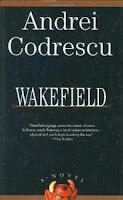Codrescu is also the founder of "The Exquisite Corpse", and taught literature and poetry at Johns Hopkins University, University of Baltimore, and Louisiana State University where he was MacCurdy Distinguished Professor of English. I understand that he is now retired from professorizing and just does the writing and his NPR gig.
Wakefield is a study of the modern, successful, single man in America. Codrescu's Wakefield seems to float through America--he's almost awash in it, as he moves from place to place, following his job as a speaker. Wakefield seems to think about roots, about anchoring himself somehow, making human connections, but it just seems incompatible with his personality. He seems to know that he might be better for it, but just can bring himself to think about anyone as much as he thinks about himself. But in examining Wakefield, or maybe watching Wakefield examine himself, Codrescu gives us a look at what it is to be a wealthy, single and unattached man, floating about like a bit of fluff.
Codrescu's language is fun to read; and its clear why he is such a force on the radio, from little bits like: "Zamyatin laughs his smoky laugh that sounds like marbles in a tin box." to pure poetry in prose form, as in this riff on a desert Indian casino:
"No one is alive here; he is surrounded by ghosts. Does it matter to anyone that eagles were once sacred? Or even that they once certified real value on gold dollars? Now they are plaster, money is dust, the Indians are smoke, and pain floats about touching maimed bodies, squeezing as hard as it can, without effect. People scream in pantomime, holding whiskey and pretending to drink, laying down fake money, shaking cups full of confetti; their corpses are carried out and more are brought in by tall, thin shadows."
That's pretty awesome. did you read it with a romanian accent?
Wakefield's relationship to the Devil, see him peeking at us on the cover? may be his most powerful connection, with the possible exception of his one friend, Zamyatin. The Devil seems, indeed, to be Wakefield's own, personal demon. And his deal with the Devil, a deal with himself. What else would we expect from so inwardly looking a man.
Read this book.

No comments:
Post a Comment
Say it, I want to hear it...